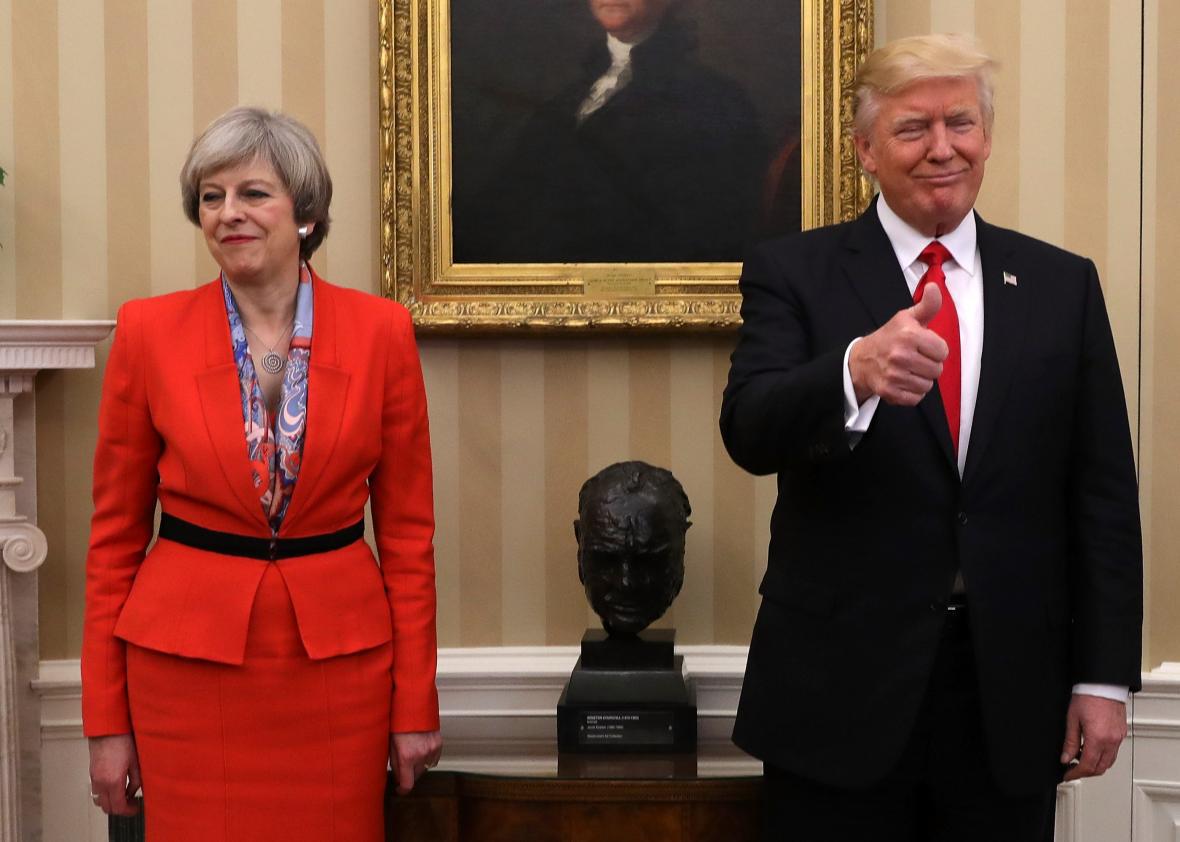This can’t be a fun trip for Theresa May. As has been widely pointed out, the mild-mannered British prime minister is not exactly a great temperamental match with President Donald Trump, whom she is meeting with in Washington on Friday and will present with a Quaich, a ceremonial Scottish cup of friendship.
May spent Thursday addressing a meeting of Republican lawmakers in Philadelphia. It was awkward. At times she seemed to be trying to seek some common ground with Trump, by talking about her determination to “defeat Daesh and the ideology of Islamic extremism” and leave behind the “failed policies” of “intervening in sovereign countries in an attempt to remake the world in our own image.” At others, she seemed to be mildly chiding him, defending the nuclear deal with Iran and the importance of NATO, and calling for the U.S. and Britain to stand up for Eastern Europe’s democracies against Russian aggression.
Even before taking office, Trump irritated May by calling for U.K. Independence Party leader and Trump campaign surrogate Nigel Farage to be named ambassador to the U.S. He’s also alarmed the British government with his hostility to NATO, chummy relationship with Vladimir Putin, and stated intention to tear up the nuclear deal with Iran. May is taking heat in parliament for even meeting with a leader who, in the words of one MP from her own political party, has spent the past week, “advocating torture, [engaging in] disgusting racial stereotyping & turning back the clock on women’s rights worldwide.”
May, not so convincingly, recently responded to a television anchor’s question about Trump’s misogyny by saying that “when I sit down, I think the biggest statement that will be made about the role of women is that fact that I will be there as a female prime minister.” She also alarmed many by suggesting that she was open to a larger role for U.S. corporations in Britain’s government-run health care system as part of a trade deal with the U.S.
At times, May has seemed to be angling for a kind of Trump-lite position in British politics, stressing national sovereignty and border security without the bombast of the Donald. Even if she’s not openly demonizing immigrants in the mode of Trump and Farage, it’s a little hard to take the paeans to the importance of tolerance in her speech yesterday seriously when her government is prioritizing immigration controls over access to European markets.
May’s main priority with Trump is setting the stage for a post-Brexit trade deal with the United States. (Her government Thursday published a bill to trigger the legal mechanism beginning Britain’s departure from the European Union.) Barack Obama, who opposed Brexit, had said that Britain would find itself at the “back of the queue” for trade deals with the U.S. if it pulled out of the EU, but Trump, aka “Mr. Brexit,” has promised to swiftly set up a new bilateral trade deal. On Thursday, he boasted that since the Brits want to “talk trade” and he doesn’t yet have a Commerce Secretary, “I’ll have to handle it myself. Which is OK.”
The need for Britain to establish new trade deals (probably combined with Trump’s alarming volatility on trade and foreign policy) is the reason May can’t afford to be as critical of Trump as British lawmakers seem to want her to be. Though May personally opposed Brexit, she’s now tasked with implementing it and Thursday in Philadelphia said that a departure from the EU would give Britain the “opportunity to reassert our belief in a confident, sovereign and Global Britain, ready to build relationships with old friends and new allies alike.” Maybe one day, but so far, it seems to mean the opportunity to grovel for the favor of Donald Trump.
